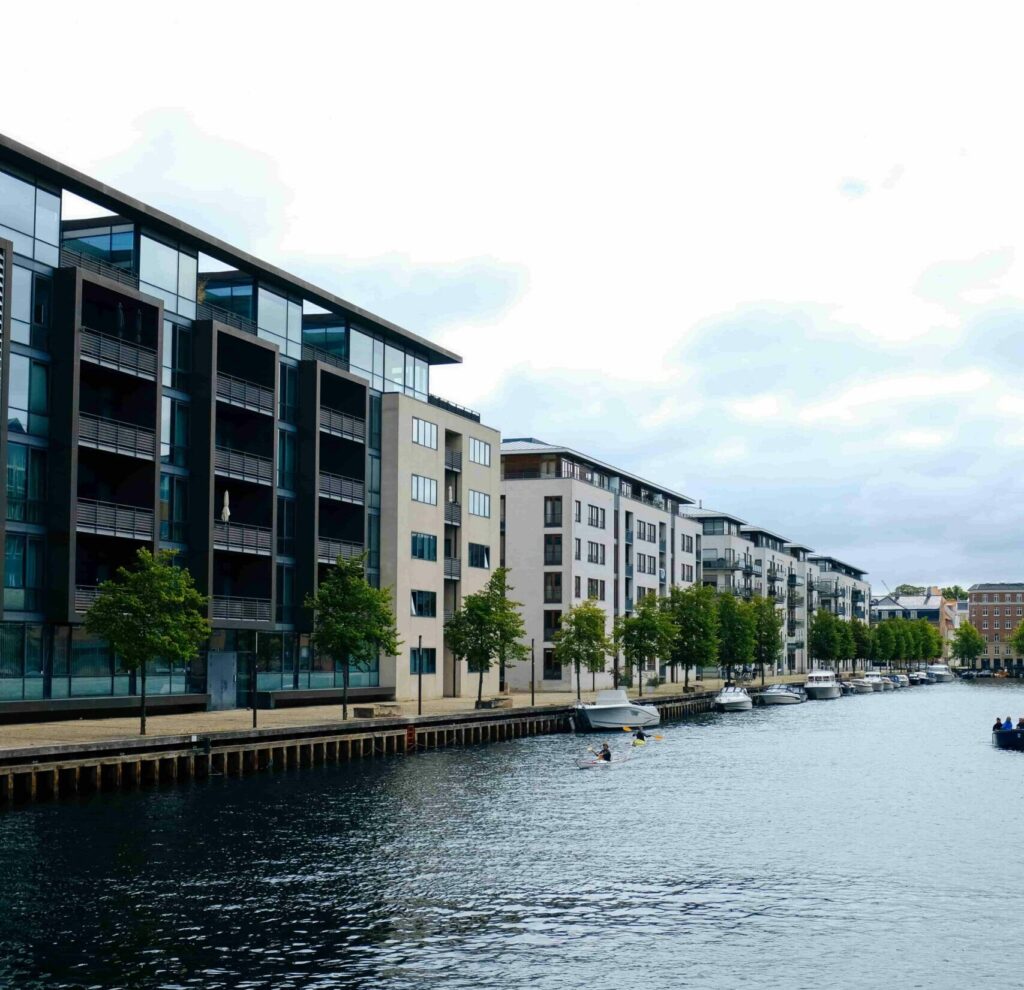Are you planning to diversify your investment portfolio? This guide analyses how to get into property investment — one of the safest investment options.
The UK commercial real estate market is the second-largest across Europe, amounting to £1.37 trillion in 2022. Up from £1.23 trillion in 2019, this market is continuously growing due to increased property prices and an influx of new investors.
If you’re wondering how to get into property investment as a new investor, it can feel like stepping into a labyrinth. Property investment can be a world filled with new jargon and an array of options that might leave you wondering where to start. But don’t worry; we’re here to help.
Property investment is a tried-and-true path to wealth creation. It refers to tangible assets that appreciate over time and can generate a steady income stream. However, like any investment, it requires knowledge, research, and understanding.
This guide is designed to simplify the process for you. Compiled by the experienced team at API Global, this post provides an overview of the essentials needed to get started in property investment. We’ve distilled our collective knowledge into an easily digestible format, ready to guide you on your journey to becoming a savvy property investor.
That said, here’s a nine-step plan summarising how to get into property investment:
- Decide on your investment goals.
- Do your research on the property market.
- Determine your budget and financing options.
- Choose a property investment strategy.
- Find the right location and property and property for your investment.
- Analyse property deals.
- Complete legal paperwork and property purchase.
- Scout for tenants or hire a property management company like Redstone.
- Review and refine your property portfolio.
Step #1: Decide on your investment goals.
Defining your investment goals is crucial in deciding your investment strategy. It involves determining what you hope to achieve from your investments — generating cash flow, capital gains, or a combination of both. By clearly defining your investment objectives, your goals and strategies are aligned so you achieve the desired outcome.
Cash flow and capital growth are two critical aspects of property investment that often work hand in hand. They’re interconnected elements that contribute to the overall profitability of your investment.
Cash flow is the consistent income you receive from your investment property, typically derived from rentals. It’s like the heartbeat of your investment, pumping regular returns into your bank account, helping to cover expenses, and potentially providing extra income.
Capital growth, on the other hand, refers to the increase in the value of your property over time. This is where the magic of property investment often lies, as this growth can significantly boost your wealth in the long term.
The beauty of property investment is that it can offer both steady cash flow and potential for capital growth. For example, a rental property in a high-growth area can provide you with regular rental income (cash flow) while also appreciating in value over time (capital growth). This dual benefit is what makes property investment particularly attractive to many investors.
Therefore, it’s crucial to look at both aspects simultaneously when considering a property investment. A property that offers steady cash flow and has strong prospects for capital growth can make for a robust and profitable investment. So, as an investor, you’re not just looking for one or the other, but ideally, a harmonious blend of both.
Defining your investment goals also helps you stay focused. By establishing clear objectives, you can evaluate potential investments based on their alignment with your goals, minimising distractions or investments that don’t serve your intended purpose. Moreover, having a defined set of goals allows you to track your progress and adjust as necessary to achieve your desired outcomes.
Step #2: Do your research on the property market.
While diving deep into UK property market research can be a great starting point to knowing how to get into property investment in the UK, it’s also an incredibly time-consuming process.
You’ll need to track historical price trends to identify optimal buying and selling times, evaluate different property types for their return potential, and spot up-and-coming areas ripe for investment.
However, there’s some good news — you can save yourself substantial research hours. At API Global, we’ve already done the legwork for you. Equipped with extensive market knowledge, we’ve streamlined this complex process into a comprehensive strategy that considers all these factors.
So, instead of spending countless hours wading through data and trends, why not leverage the expertise and insights we’ve already gathered?
Our team at API Global is ready to guide you, helping you make well-informed decisions in your property investment journey. Now is a great time to take advantage of the API solution and fast-track your way to successful property investment.
We consider the following criteria to make an informed decision:
- Infrastructure: Are there plans for new roads, transport lines, and schools? These factors attract buyers and tenants, driving prices up.
- Economic Policy: Do the economic regulations favour business owners? Are new businesses opening up? What’s the projected job growth like? A robust and diversified economy means a healthy property market with opportunity.
- Yield and Capital Value Trends: How much have property prices risen in the past few years? Is there room for more growth in the future? Locations with a positive yield and capital value increase make for the best investment.
- Demographics: Are younger families moving in, or is it an area populated by retirees? This can impact rental demand and property values. Comparatively, a younger population can assure you of steady growth and more robust income.
- Amenities: What entertainment, shopping, dining, and outdoor options are easily accessible? Places with lots to do tend to see higher property values and demand.
To identify property hotspots, we conduct a 121-point due diligence assessment and apply an appropriate deal structure to ensure our investors enjoy the best offers. In essence, investing with API means you’re working with property experts and don’t need to go through the stress of knowing/researching the market. You may follow us on social media (LinkedIn or Instagram) to get insights into the current state of the market.
Step #3: Determine your budget and financing options.
Getting into property investment requires figuring out your budget for the property. Consider how much cash you have available and how much you can borrow.
At API, we charge a £5K reservation fee, while most of our developments require a 20% deposit and 80% on completion. If you don’t have enough saved yet, keep saving while you learn the ropes. You want to make sure you don’t overextend yourself financially. Alternatively, you may explore other financing options outlined below.
Explore your financing options.
You have a few choices for funding your property purchase, including the following:
- Cash: Using your own money is the most straightforward approach but may limit how much you can invest.
- Mortgage: A traditional mortgage allows you to borrow money from a bank or lender to finance a portion of the property cost. You’ll need to qualify based on your income and credit score (if you’re UK based).
Calculate your costs.
Ensure you factor in all the expenses associated with buying and owning an investment property, including the following:
- Down Payment and Closing Costs: We charge a £5K reservation fee and a 20% downpayment of the purchase price. The remaining 80% is paid upon completion, via cash or mortgage
- Mortgage Cost: The total interest paid over the lifetime of your mortgage.
- Stamp Duty: Tax charged by the government when you purchase a property.
- Management Fees: These costs will be incurred when hiring a property manager. Our sister company, Redstone, charges only 10% of rent in management fees.
Knowing your budget, financing options, and costs upfront will ensure you go into your first property investment with realistic expectations and avoid any unwelcome financial surprises down the road. Work with your wealth manager to determine how much you can afford to invest.
Step #4: Choose a property investment strategy.
It’s now time to determine your investment strategy. When choosing how to get into real estate in the UK, we recommend looking into buy-to-let options.
Buy-to-let is a popular choice for new investors; you purchase a property and then rent it out to tenants. The goal is to generate rental income and benefit from potential capital appreciation over time. Look for properties near employment hubs, public transit, schools, etc., that will attract long-term tenants.
Your chosen strategy will depend on your investment goals, risk tolerance, experience, and access to capital. Don’t feel limited to just one — you can combine multiple strategies for the best results.
The key is starting small, learning the ropes, and expanding over time. Suffice to say, with hard work and persistence, you’d be well on your way to quickly building a thriving property investment portfolio.
And if you need help at any point, our advisors are here to guide you. Reach out to us today to see how we can help you implement your property investment strategy.
Step #5: Find the right location and property for your investment.
A critical step in knowing how to become a property investor is pinpointing the right location. At the end of the day, you can change a house, but you can’t change its location.
At API, our property selection process is rooted in thorough research and strategic planning. Here’s an overview of what we look into when sourcing projects:
a. Location Analysis
The bedrock of our approach is identifying the perfect location for your investment. We understand that the locale can make or break an investment opportunity. Hence, our expert team conducts extensive research, factoring in elements like:
- Demand and Growth Potential: We focus on regions with burgeoning populations and economies, as well as areas experiencing infrastructural investments and new business setups.
- Amenities: We assess the proximity to essential facilities such as schools, hospitals, public transit, entertainment venues, dining options, and outdoor spaces. These amenities not only increase the property’s value but also appeal to potential tenants.
- Investment Goals Alignment: We aim to align the property with your investment goals. Whether you’re seeking significant capital appreciation or consistent rental income, we identify locations poised to deliver on your objectives.
- Economic Indicators: We consider variables like yield trends, economic policies, and corporate behaviour to ensure we’re advising investments in areas with promising futures.
b. Due Diligence
Our UK-based sourcing team conducts a meticulous 121-point due diligence assessment before signing off on any investment opportunity. This rigorous process ensures we secure the best deals for our investors.
c. Investment Advice
Our global API team offers personalised investment advice, empowering you to make informed decisions. We aid in selecting the correct investment opportunity and purchase structure in line with your needs.
d. Sales Progression
Our dedicated support team processes the reservation and KYC documentation while acting as a liaison between all parties. We guide you every step of the way, simplifying the purchase process.
e. Legal Support
We recommend leading conveyancing firms to act on your behalf legally, ensuring a smooth and secure property purchase. Our team will support you throughout until the contracts are exchanged.
f. Construction Updates
We maintain regular communication, providing construction updates and monthly newsletters to keep you informed about your investment’s progress.
g. Mortgage Support
We advise you to begin the mortgage process six months before the development’s completion. We recommend the best lenders based on your personal situation.
h. Completion Phase
Before completion, we provide a detailed breakdown of the steps required to finalise your investment, including furniture packs if needed.
i. Lettings & Management
Our partner, Redstone, handles all letting solutions, from securing tenants to daily property management. They charge only 10% of the rent.
j. Portfolio Optimisation
When the time comes to exit your investment, our dedicated resales team is at your service. Alternatively, we can offer suggestions on how to release equity from your portfolio and maximise returns.
At API, we’re committed to making property investment a seamless and rewarding process for you.
Step #6: Analyse property deals.
Diving into property deals analysis is a crucial step in knowing how to start investment property. This is where you put on your detective hat and start unravelling the potential of each property.
It’s a thrilling process, and every successful analysis brings you one step closer to mastering the art of property investment.
API Global is fully equipped to handle this intricate process for you, saving you time and effort. Here’s a sneak peek into how we navigate the process:
- We start by evaluating the property’s potential for cash flow and appreciation. Namely, we ensure the property’s potential income and growth align with your investment goals.
- Then, we delve into the numbers. Here, we look into the property’s expenses and calculate key metrics such as the cap rate and cash-on-cash return. These metrics will give you an objective evaluation of the property deal and its potential profitability.
- Finally, we take into account any necessary enhancements or improvements to the property, factoring these costs into your financial projections. The bottom line is that the numbers need to add up and make sense for your investment strategy.
Again, the expert team at API Global has already taken all these into consideration, and you can always take advantage of that. You needn’t dive into the analysis yourself; expert help is always at hand to streamline your journey to successful property investment. Moreover, there’s no fee for working with API Global, so you literally have nothing to lose.
Step #7: Complete legal paperwork and property purchase.
Once you’ve found a property you want to purchase based on the offer, it’s time to complete the necessary legal paperwork. This step finalises the sale and ensures the property legally becomes yours.
Here’s how the API Global team navigates the legal process for investors seeking how to start a property investment:
a. Working with a solicitor.
We partner with a licensed conveyancing solicitor to handle all your property purchase legal aspects. They’ll review the sales contract, conduct searches to check for any issues with the property, and manage the exchange of contracts and completion.
The best part is that our solicitors are experienced in property law and conveyancing, ensuring you get the most tailored legal help and advice possible.
b. Reviewing and signing the sales contract.
The sales contract details the agreed-upon sale price, completion date, what’s included (fixtures and fittings), and any special conditions. Our solicitors carefully review this document for possible loopholes before you sign it, as it’s legally binding.
c. Conducting property searches.
Our solicitor will conduct local authority searches to check for any planning permissions or restrictions on the property. They also embark on environmental searches to check for risks like flooding or contamination. This ensures all issues are addressed before the exchange of contracts.
d. Exchanging contracts.
Once all parties have signed the sales contract, searches are done, and a completion date is set, contract exchange can take place. This is the point where the sale becomes legally binding, and we pay a deposit of the purchase price on your behalf.
e. Complete the purchase on the completion day.
On the pre-agreed completion day, the remaining balance of the purchase cost is paid. Once finalised, the API Global team will hand over the keys to you, the new property owner.
Congratulations, you now have a new investment property!
***
As part of our encompassing API Solution, the team at API Global is committed to providing the best legal support to facilitate the contracts exchange process. Contact us today for more details on how we can help you achieve this.
Step #8: Scout for tenants or hire a property management company like Redstone.
Once you’ve acquired an investment property, the property begins to appreciate in value over time. Additionally, you may consider how to get into the property market for rental profit. Here, you decide whether to find tenants yourself or enlist the services of a property management company. Both options have advantages and drawbacks, so consider them carefully based on your circumstances and objectives.
Finding Tenants Yourself
Sourcing for tenants directly can be the right choice if you prefer to generate rental income promptly without going through property management agencies.
Here’s what it entails:
- Advertise your property for rent on popular platforms like Rightmove, Zoopla, or Facebook Marketplace. Highlight its features and amenities to attract potential tenants.
- Interview prospective tenants, verify their references, and assess their credit history to ensure you find reliable renters.
- Have tenants sign a legally binding tenancy agreement that safeguards their rights and yours as the landlord. Clearly outline responsibilities, rent due dates, deposit details, and other pertinent terms.
- Collect monthly rent payments and handle any maintenance or repair issues. If desired, you can engage a letting agent to handle these tasks in exchange for a percentage of the rent.
Managing the Property through a Management Company
Alternatively, you can hire a property management company like Redstone if you prefer a more hands-off approach or lack the time and expertise to manage the property yourself.
This arrangement involves the following:
- Select a reputable property management company specialising in overseeing rental properties. Conduct thorough research and seek recommendations to ensure a reliable choice.
- Entrust the management company with responsibilities such as advertising the property, screening tenants, and handling lease agreements.
- The management company will collect rent payments on your behalf and handle any necessary maintenance or repairs. They’ll also serve as the primary point of contact for tenant inquiries and concerns.
- In exchange for their services, the property management company will deduct a fee, typically a percentage of the rental income, from the proceeds.
Step #9: Review and refine your property portfolio.
Once you’ve gone through the steps of how to get into property investment and you’ve successfully built up your real estate portfolio, you must ensure you regularly review and refine your investment to maximise your returns.
Here are some tips to keep your portfolio in tip-top shape:
a. Check in on your properties.
Regularly keeping tabs on your properties and their performance is a vital aspect of successful property management. Allocate time each month to assess the state of your investments.
Are the tenants keeping up with their rent payments? Are there any pending maintenance concerns that need your attention? These are the kinds of questions you should be asking to ensure smooth operations.
While physically visiting each property might not always be feasible, staying updated is crucial. This is where your property management companies come in. They should provide you with regular and relevant updates about your properties.
By actively checking in and staying up-to-date with the situation, you’re not only ensuring the well-being of your properties but also mitigating potential surprises in the future. Remember, effective property management is all about proactive, not reactive, steps.
b. Rebalance as needed.
As market conditions change, the value of different property types and locations can shift. You may need to sell some properties and buy new ones to rebalance your portfolio.
c. Refinance when interest rates drop.
Consider refinancing if interest rates decrease substantially from when you first financed your properties. You may be able to lock in a lower rate and reduce your payments, increasing your cash flow. Before you proceed, run the numbers to make sure refinancing makes sense financially based on closing costs.
FAQ: How to Get Into Property Investment
What is the best way to start in property?
The best way to start in property, specifically in the UK market, entails the following:
- Educating yourself about the market and investment strategies
- Setting clear goals
- Researching the UK property market
- Building a network of industry professionals
- Securing financing
- Starting with a manageable investment
- Conducting thorough due diligence
- Seeking professional advice
Following these steps can lay a solid foundation for a successful entry into the property market.
How to get money to invest in property?
To acquire funds for investing in property, consider these three approaches:
- Savings and Personal Funds: Start by assessing your savings and personal finances. Determine how much you can allocate towards your property investment. This approach eliminates the need for borrowing and minimises interest costs.
- Financing Options: Explore various financing options available to property investors, such as a mortgage. Research different lenders and compare interest rates, terms, and repayment options to find the most suitable option for your financial situation.
Note: Having a well-structured investment plan and demonstrating financial responsibility can increase your chances of securing the necessary funds to invest in property.
Conclusion
The key to understanding how to get into property investment and building your real estate portfolio lies in following the various steps outlined in this post. Although it may seem like a lot of work, focus on taking it one step at a time.
Start by saving, researching, finding good deals, getting the right financing, and taking action. In no time, you’ll be well on your way to purchasing your first investment property. Afterwards, use the experience from your first deal to improve your process and purchase more properties.
Don’t forget the API Global team are ready to help you with all of these steps.
So, what are you waiting for?
Disclaimer: Any information provided by API Global does not constitute financial advice and is for educational purposes only.










